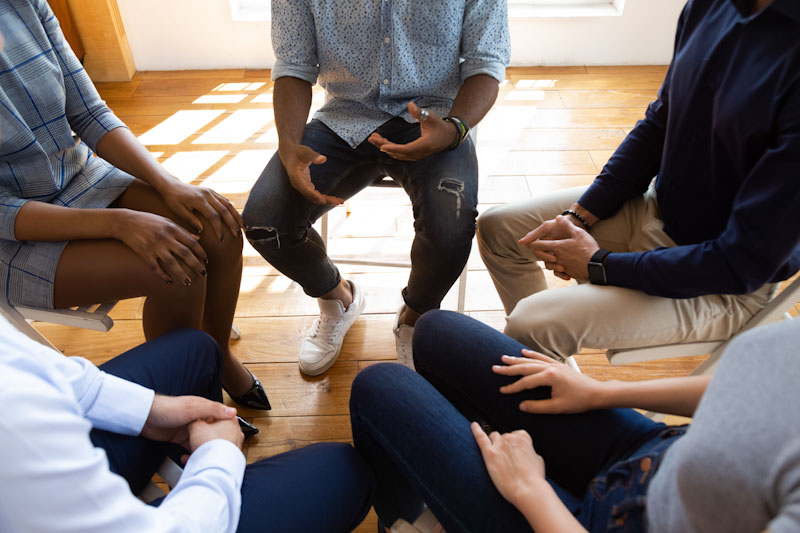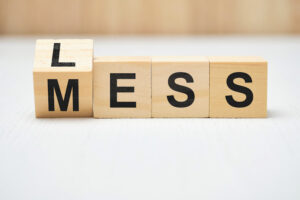We’re in This Together: Building a Healthy Sober Support Network
You are the captain of your recovery, but you don't have to do it alone. A sober support network will lift you up in tough times and celebrate your triumphs

Addiction kills relationships, in slow erosions or big explosions. So when you embark on recovery, it’s natural to feel bewildered by everything you’re going to take on — and alone in doing it.
But you aren’t a unique screw-up or failure. You aren’t a screw-up or failure at all, as you’ll see. People who have overcome addiction are legion, they’re making the most of their lives and they’re a generous lot. They’ll be the foundation of your sober support network.
Community and connection are essential to recovery. Many would say they are the most essential part of it. Even in the early days of the modern sober movement, the authors of Alcoholic Anonymous’ so-called “Big Book” recognized that “nothing will so much ensure immunity from drinking as intensive work with others [in recovery].”
What Exactly Is a Sober Network?
In active addiction, many people choose isolation over connection. Sometimes it’s a conscious choice, out of fear that their addiction will be discovered or worry that someone might try to intervene in their addictive lifestyle. Sometimes, relationships just fall away.
In recovery, this way of living and thinking has to change. This is where a sober network comes in.
A sober network is pretty much what it sounds like. It’s a group of people, usually in recovery themselves, that you can rock with when times are great and lean on when times get tough. Your sober network may also include your counselors or coaches that specialize in recovery and sober allies in your family, friend group or workplace.
Your support network is basically just people invested in sobriety who care about you and want you to thrive! These people can also give you the best shot at that “immunity” mentioned in the Big Book. Nowadays, we often call that kind of checking-in “accountability.”
Creating your sober network is an excellent way to make new connections and grow in recovery. Here’s some good news if you’re new to recovery: building an expansive and effective sober network is incredibly easy.
Finding a Sober Network Online
We’re big believers in the power of online recovery communities (why not check out ours?), so we’ll start there. Through social media and forums, connecting with anyone has become exponentially easier in recent years, and that goes for people in recovery too.
There are many, many digital communities, hashtags and chat groups that give people in recovery a place to connect and discuss what’s going on in life. You can find common ground over the challenges of sobriety, the rewards of recovery and the fallout from addiction. This connection via shared experience can be crucial when it comes to remembering how rough things used to be, and navigating what comes your way in life now.

Of course, online connections are not the only way to create a sober network. There are also many traditional IRL ways to make these connections happen. Two big ones are engaging with the “recovery peers” you meet in treatment and joining recovery support groups.
Coming Out of Treatment? Get To Know Your Fellow Alumni
Recovery peers can be key allies in your recovery. They have felt addiction, like you. They have felt, or are feeling, the complex experiences of early recovery. That’s especially true of your fellow travelers who’ve gone through the same treatment as you. This shared experience of the same treatment center is a great jumping-off point for finding someone who understands your recovery.
Many treatment centers have robust alumni programs for this reason; these are the folks who have graduated from treatment. Your alumni program helps you start and nurture your sober network, keeps you connected to others in recovery, keeps you in the loop about events and opportunities with the treatment center, and gives you continued access to the care and expertise of the recovery professionals there.
Friends Who Have Been There: Joining a Recovery Support Group
They’re open to most everyone, you can find them almost anywhere, they’re free, and they’re full of people who want to help you stay sober: That would be the tried and true recovery support groups.
Wherever you’re at in your recovery, you can join like-minded peers at in-person or online group meetings. Find these people in the rooms of Alcoholics Anonymous, Narcotics Anonymous or other 12-step groups. SMART Recovery, LifeRing, Recovery Dharma are other orgs that run meetings.
It’s very easy to make friends in these groups, even if you’re shy. Group members often get together informally for lunches or other activities, and you can find sponsors or mentors there as well.
In a Jam, in a Rut? Call a Sober Supporter
Part of having a healthy sober network is having people in your corner, ready to step in and help out when toxic situations arise. Recovery peers are ideal for these types of situations. They’ve been through them before, and they know what to do. They also know what not to do.
For example: In early recovery, you might become “triggered” by seeing and conversing with an old friend who’s unaware of your sobriety. You might get offered a drink. What to do?
Take a beat, call up a recovery peer from your sober network, and get bolstered in your decision to turn down that drink. Maybe the right call is to leave the scene; maybe it’s an opportunity to open up to your old friend about your sobriety. But having someone to buck you up in these unfamiliar or uncomfortable situations can make all the difference.
In early recovery, it’s normal to find yourself in environments that are triggering — and to experience bleak moments. Sobriety can be overwhelming! Your sober network is your lifeline. A sober voice on the other end of the line can walk you through a situation, talk you down from using, or drive over to pick you up or help you out.
These are people who are willing to drop everything to help others with sobriety. That’s what strong sobriety and a strong sober network look like.
You Have to Give It Away to Keep It: Become the Sober Supporter
In 12-step recovery, they say, “You have to give it away to keep it.” What that means is that by helping others with their recovery, you’re ultimately furthering your own.
Life is about the connections we make and the people we help along the way. Once you have your sober network in place, you’ll feel the embrace of community, and you’ll find confidence in your own sobriety.
Then, when the next person comes through the door of recovery, you can be the supportive voice in the meeting or on the other end of the line.
More Help & Information
Sobriety vs. Recovery: What's the Difference?
Are the concepts themselves up for debate? Do they require certain treatments, or abstinence from everything? It's complicated! And new ways of thinking are changing the conversation.
Now Elite NFL Players, They First Tackled Addiction | News Roundup
All Sober compiles the best of the latest headlines. Here's your addiction and recovery news for the week of Feb. 19, 2024!
Help Them Help You: Explaining Your Mental Health to Your Family
Your mental health can affect — and be affected by — your loved ones. Here's how to discuss it with them so everyone can heal.
Dry January (and Beyond): The Possibilities Are Endless
There's never been a better time to go sober. Whether you're trying it out this month or already living the life, join us for some tips, ideas, inspiration — and maybe even new friends.
Sober Holiday Tips: Meeting 'Share-a-Thons'
Need to get out of the house for a bit and see some friendly sober faces? Recovery support group meeting marathons run 24/7 from Christmas Eve through New Year's Day.
What Happens After an Intervention?
Your loved one agreed to get treatment for addiction during their intervention — or not. Here's what you need to know about what comes next.
Real-Life Recovery Tips: Phone a Friend
When you're traveling, you can take your sober support network with you — right in your pocket. Rocker Kasim Sulton shares his top recovery tip in this video.
Easy Does It: Tips To Keep It Simple in Early Recovery
It's harder to make recovery work if you overwork yourself. Here's how to keep your focus on what matters now.











